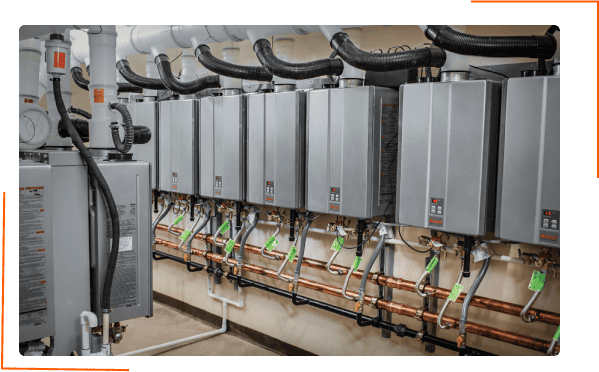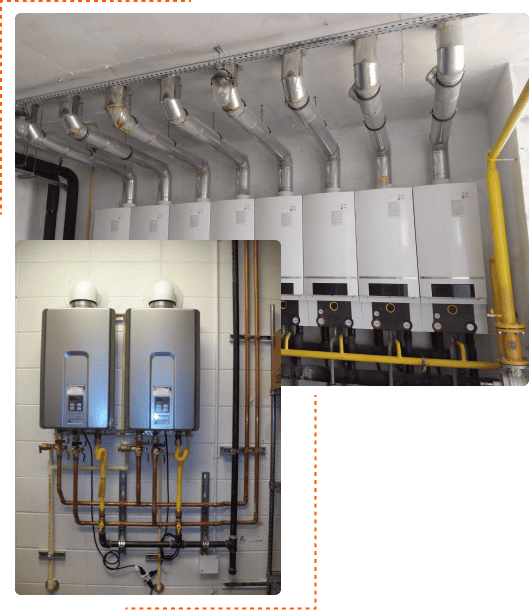Electric Hot Water Heater

Request Service
Enter Your Correct Detail Here
To Help You Better And Fast

(916) 999 - HEAT

Enter Your Correct Detail Here
To Help You Better And Fast




We all dislike cold showers. That’s why most people have at least an electric hot water heater in their homes, accounting for most households’ electricity bills.
Electric water heaters provide hot water for different appliances, including showers, dishwashers, washing machines, single taps, and baths. They range in capacity from 2 to over 100 gallons depending on the number of appliances they support.
At Water Heater Wiz, we offer state-of-the-art electric water heaters that will last. Our technicians will install and repair your electric water heater to ensure proper functionality throughout its lifetime.

Electric water heaters use electricity to heat cold water and distribute it where it’s needed. Small models of electric water heaters connect to electricity by plugging the electrical cord into an outward plug. Big models with a capacity of 30 gallons and above must be connected directly to a 240-volt circuit dedicated to the water heater.
Electric water heaters have nine different components that help them function properly. They include the following:
Inside the water heater itself is a tank containing a protective liner. In a standard residential system, the liner holds anywhere from 40-60 gallons of hot water at a time. The outside of the tank is wrapped with an insulating substance such as polyurethane foam. That substance is covered by an outer shell which is what we see when we look at the water heater in our homes.
This tube feeds cold water to the bottom of the tank, where a heating element heats it.
This is situated outside and above the tank. The valve stops water from flowing into the tank.
A water heater heat-out pipe is an insulated metal piping system that releases hot water from a water heater into the home's plumbing system. It helps to maintain desired temperature and pressure of the hot water, thereby increasing efficiency. It also provides enhanced safety during extended periods of non-use or during the malfunctioning of the water heater.
The heating mechanisms, located within the electric water heater, heat the water for use.
An electric water heater thermostat is a device used to regulate the temperature of hot water tanks. It controls the amount of energy supplied to the tank, which in turn adjusts the temperature of the hot water. The thermostat also helps manage energy usage and helps reduce monthly utility bills.
A water heater drain valve is a device installed near the bottom of a hot water heater that allows for draining the tank. This valve is opened to flush sediment and mineral deposits from the tank and perform maintenance on the heating elements.
A water heater pressure relief valve is a safety device used to protect a hot water tank from becoming over-pressurized and potentially exploding. The valve opens automatically when the pressure inside the tank exceeds a predetermined level, allowing the water to safely exit through the outlet pipe.
A sacrificial anode rod is a metal rod that is placed in water heaters to protect the tank from corrosion. It is made of a more reactive or electrically active metal than the tank itself, allowing it to corrode in place of the tank, sacrificing its life to extend the heater's lifetime.
Understanding the different elements of an electric water heater can help you ensure that it runs efficiently and safely. Regular maintenance, proper installation, and replacement of parts can extend the life of your water heater and help keep your family safe.

Generally, it takes an electric water heater anywhere from 30 minutes to one hour to heat up the full tank. The amount of time it takes for the tank to heat up is dependent on several factors, such as the size of the tank, the temperature setting, and how much hot water has been used in that period. Additionally, certain models may come equipped with features like quick recovery or energy saver modes which can reduce the amount of time it takes to heat up the tank.
However, the following are the seven factors that influence the time an electric water heater takes to heat water:
Since tankless electric water heaters don’t have a storage tank, they heat water in minutes or even seconds. This makes them convenient for large houses with high hot water demand, unlike the conventional electric water heater.
Like any other machine, electric water heaters have a service life span they can’t surpass. This is about 10- 15 years, with tankless electric water heaters serving beyond 15 years.
There are signs to look out for that suggest your electric water heater has served its lifetime and it could be time for a change. They include:
we don't recommend using electric water heaters older than 15 years. With old age comes many inefficiencies, regardless of how well-maintained your water heater is.
hot discolored water indicates a lot of wear and tear in your water heater, eventually leading to leakages. This is a classic example of a water heater that has served as long as possible.
waking up to cold water is a nightmare. Only a professional can ascertain the water heater's problem. Otherwise, you might have to buy a new electric water heater.
water leakages are the ultimate sign of needing a new electric water heater. Call Water Heater Wiz today!
When our professionals do an electric water heater maintenance routine, they add more life to your water heater. Water heater maintenance is important not only to extend the useful life of your water heater, but to keep it in safe working condition.
Here are 4 things we look at when maintaining electric water heaters:
This valve opens up and releases water if too much pressure has built up inside the tank of the water heater. The valve should be replaced every 3-5 years but checked bi-annually.
Scale Inhibitor maintenance helps to reduce the buildup of mineral deposits on the heating elements. This type of maintenance is done by adding an inhibitor chemical to the water supply, which works to prevent minerals from sticking to the heating element and creating scale. While this type of maintenance is not necessary for all types of electric water heaters, it can be beneficial for those that are prone to scale buildup.
While the Anode Rod helps to keep your water heater safe from corrosion, it can't get every little piece. Over time, sediment will build up inside the water heater tank and must be flushed out. If you have an abundance of sediment, your water likely won't stay hot as long as it should.
This sits at the top of your water heater and keeps the inside of the water heater safe from corrosion by attracting elements within the water that cause oxidation. The Anode Rod should be checked yearly and replaced every 3 years.
Cold showers are such buzz kills, but electric water heaters are here to uplift our moods even through winter. If you require repairs, maintenance, or a replacement of your electric water heater, wait no more. Call us today for a Water Heater Wiz Electric Water Heater services estimate!